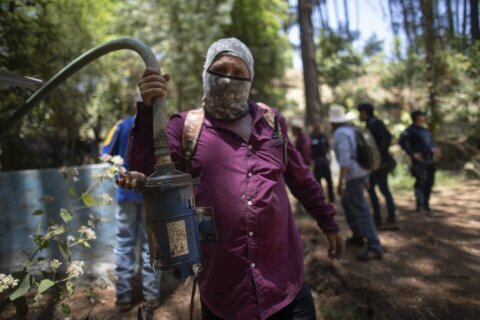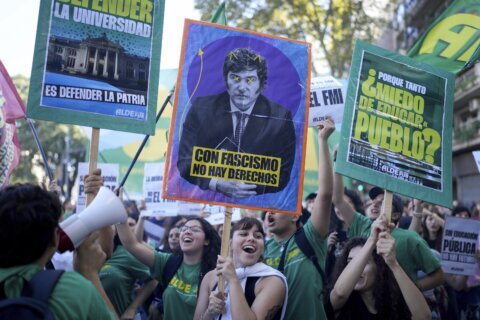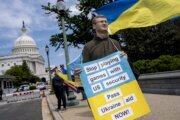WARSAW, Poland (AP) — Protesters and a large installation representing Russian atrocities in Ukraine blocked the path of Russia’s ambassador to Poland as he sought Tuesday to place a wreath at a Warsaw memorial to Soviet soldiers on Russia’s Victory Day holiday.
The Russian Foreign Ministry strongly criticized Poland over the incident, saying the Warsaw government was informed in advance of the ambassador’s plan to visit the Red Army cemetery and memorial site, and did not act to ensure that he could pay his respects at the memorial.
The ministry said in a statement that the incident demonstrates “the duplicity of Warsaw’s policy in assessing the events of World War II and trying to forget about the role of our nation in saving European countries enslaved by Nazi Germany.” It added that the incident “will not remain without a proper reaction.”
The installation in Warsaw included hundreds of fluttering blue and yellow Ukrainian flags and crosses serving as symbolic grave markers for Ukrainians killed by Russians during the full-scale war launched by Moscow last year.
A pool of fake blood below the crosses underlined the stark message of the protest, which was put up by Euromaidan-Warszawa, a citizens’ initiative that supports Ukraine.
Organizer Viktoria Pogrebniak said the installation, set up for the day at the entrance to the Red Army memorial site, was meant to fight back against Russian propaganda, and “show the real picture to the world.”
“We are bombed, we are killed, we are raped,” Pogrebniak said. “We are killed just because we are Ukrainians.”
She said the ambassador and other Russian diplomats would have to walk over the symbolic corpses of Ukrainians “or will need to go through the bushes,” if they wanted to reach the memorial.
With his path blocked, Ambassador Sergey Andreev instead left a wreath of red carnations in front of the hundreds of Ukrainian flags as loudspeakers blasted the sounds of bombs and air sirens.
The installation also included large mock-ups of bombed buildings and the names of Ukrainian cities where Russia has carried out atrocities against Ukrainians: Bucha, Irpin, Mariupol, Bakhmut.
The protesters surrounded Andreev and his entourage and yelled “Ruscists,” an insult that combines the words “Russians” and “fascists.”
Andreev was doused with a red liquid at the same place on Victory Day last year.
Some Poles also showed up through the morning and did make their way across the symbolic cemetery or through the bushes to reach the Red Army memorial to leave flowers. That triggered the anger of the protesters who denounced them as “provocateurs” serving the Kremlin’s interests.
“They are traitors to Poland,” shouted one activist, Katarzyna Augustynek. She seized a bouquet of white carnations left by a woman and threw it to the ground, triggering an angry exchange with the other woman.
The Red Army soldiers died in the Allied fight to defeat Nazi Germany during World War II. But many Poles also remember how they carried out rapes and other crimes, and they resent the decades of Soviet control that came next for their nation.
Poland threw off Moscow-backed communism in 1989 and today is a strong ally of Ukraine. Poland is supplying weapons to Kyiv and giving refuge to many Ukrainians, and there are very few who actually support Moscow.
Copyright © 2024 The Associated Press. All rights reserved. This material may not be published, broadcast, written or redistributed.







